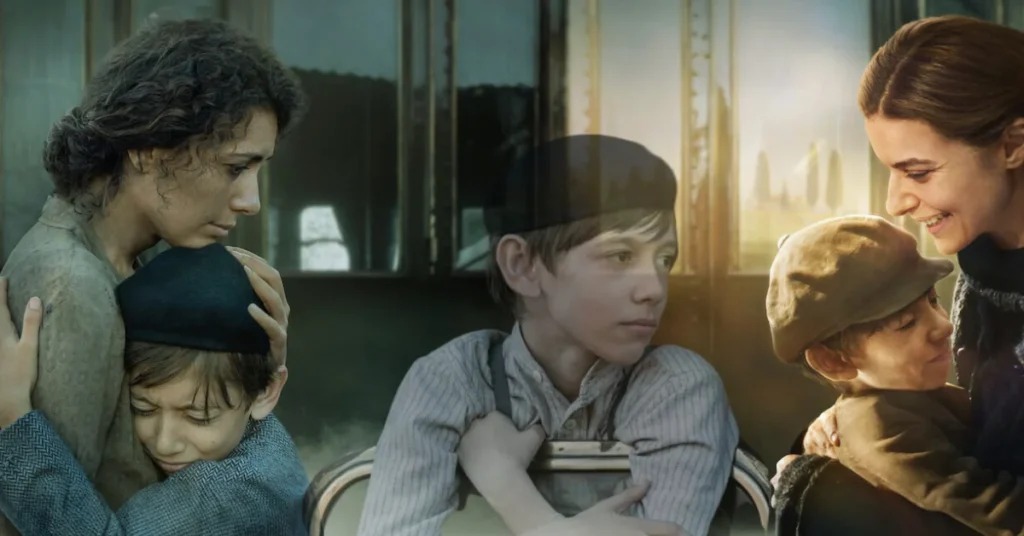Summary
The Children’s Train offers emotional insight into a lesser-known true story of post-war Italy. The film resonates with great themes and provides the contrasting lives of two mothers rather effectively, adding to an impressive filmography by Cristina Comencini.
Adapted from Viola Ardone’s novel Il treno dei bambini and directed by Cristina Comencini (Tornare, Sex Story), The Children’s Train is set in 1946, post-World War 2 in Italy. The story revolves around Amerigo Speranza, a naive young boy from poverty-stricken Naples, who is sent to live with a temporary, adoptive family in Northern Italy as part of the “Trains of Happiness” initiative.
To provide historical context, as it is important to this drama, the “Trains of Happiness” was a post-war idea implemented by the Italian Community Party and the women’s organization Unione Donne Italiane (UDI). Between 1945 and 1952, the Italian Community Party transported around 70,000 children from the poor areas of southern Italy.
The objective was to ensure that children had better living conditions and opportunities after the country was torn apart during World War 2.
The Children’s Train strongly hones in on the historical context as it bears the bones of the main themes. The story of poverty and resilience is in the eyes of Antonietta Speranza (Serena Rossi), Amerigo’s mother. She appears cold and straightforward with her son. But she’s the product of hardship-doing what she absolutely can for her son during turbulent times.
The quest for a better life is the cornerstone of the movie, highlighting a pivotal time in Italian history. Amerigo’s biological and adoptive mother (Derna—Barbara Ronchi) represent contrasting lives for their son. Both have the same objective: increased happiness and quality of life.
Antonietta’s approach is cold and pragmatic, but it reflects a world that needs no sentimentality, as survival is the only measure of life. On the other hand, Derna offers a nurturing environment that opens the world up. For Amerigo, this provides two different experiences, which must be uniquely confusing as a child.
Amerigo is almost the furniture in the story—his experiences and how they form his perception are important. With one mother, he experiences hardship and toil. With the other, he has the opportunity and privilege to play the violin.
This lesser-known chapter in Italian history may provide further context to World War 2 for many viewers and its impact on children and mothers. While the fathers indeed had the worst hand of going into battle, the family home underwent a transformational change that recontextualized parenting and what it meant for offspring.
While The Children’s Train is not entirely a true story, it is based on real historical events. Italy underwent this transition, and the Netflix film fictionalizes it for dramatic effect. The lives of Amerigo and his mothers indicate what happened to real people at the time.
The Children’s Train was adamant about bringing that authenticity—the movie was filmed in various Italian locations, including Pistoia and Montalcino in Tuscany, Naples, and Reggio Emilia. Director Cristina Comencini captures the essence of Italy at the time with well-chosen backdrops to back up the story.
I truly enjoyed this movie. The acting could have been less on the nose and provided a better context in some areas. The slightly exaggerated moments often thin the story a little, especially when the children are acting, but the film makes up for it with Antonietta’s mother-like stoic resilience and Derna’s warmth and nuance.
The film gets its points across succinctly. Despite the murky overlay of the times, the power and bond of motherhood are prominent throughout.
The movie’s beginning and end bring it full circle, providing a thought-provoking and impactful conclusion. A beautiful musical score by Academy Award-winning composer Nicola Piovani helps tailor those emotions throughout.
The Children’s Train feels like an important piece of filmmaking, highlighting a paramount moment in Italian history. And it is delivered well.




